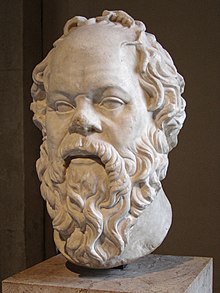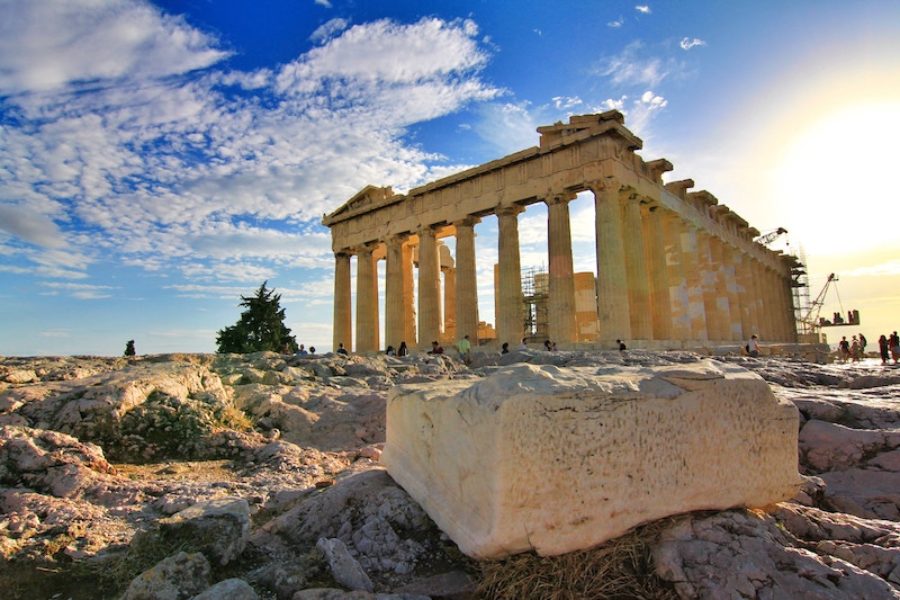Plato’s Apology about the trial and execution of Socrates shows striking similarities to our times. Both today and 399 BC were periods of significant change, intolerance for uncomfortable truths, along with clinging to tradition. In a sense, Socrates’ execution reinforces the universal struggle of science and rationality against emotion and tradition found in every society. Rationality and willingness to stand up for truth are under assault today, just like in Socrates’ execution.
Socrates, the first great philosopher, established the pillars of rationality and veneration for virtue over convenience. In this essay, I explore the circumstances and attitudes that lead up to Socrates’ execution and draw similarities to our own time.
This essay is the first in my series of commentaries on Plato’s Dialogues. You can read the second, The Philosphy of Love: Plato’s Symposium, here. If you’re wondering why I write essays like this read about my blog, here.
The Times of Socrates’ Execution
We live in an epoch of science and reason that emerged from the European Dark Ages. Most people know about the collapse of the Roman Empire and the Dark Ages, leading up to our own time. Few know about the Late Bronze Age Collapse that caused the Greek Dark Ages. Wikipedia describes this as:
The Late Bronze Age collapse involved a Dark Age transition period in [advanced bronze age civilizations like the Egyptions who built the pyramids], a transition which historians believe was violent, sudden, and culturally disruptive. [This disentegration resulted in] the small isolated village cultures of the Greek Dark Ages.
Socrates lived at the end of the Greek Dark Ages. The Athenians executed him for preaching reason. But, his philosophy led to the Hellenic epoch of progress, including the Roman Empire. Homeric myths of gods and heroes like the Trojan War and the Odyssey dominated the Greek Dark Ages just as the Catholic Church and the feats of knights like King Arthur dominated our more recent European Dark Ages.
Like our own time, Socrates’ execution in 399 BC took place after a century of wars and intense conflict. We live with the backdrop of two World Wars and the Cold War from the twentieth century. Ancient Athens fought the First and Second Persian Wars and the First and Second Peloponnesian Wars in the lead up to Socrates’ execution.
Rationality Opposes Superstition
Basically, all that history becomes relevant in Socrates’ execution because rationality always exists in opposition to superstition. The mob that executed Socrates was hyperfocused on the heroic poetic tradition of Homer. Athens had just lost the second Peloponnesian War. In addition to the humiliation of defeat, the Spartans wiped away Athen’s tradition of democracy. They installed an oligarchic system of government called the Thirty Tyrants. Athens reestablished democracy under circumstances that emphasized the need for a strong military to defend them from a dangerous world. Unlike our own time, powerful individual heroes and tough generals determined success or defeat in battle.
Ideas of rational discourse and logic, before the power of science, was understood, were seen as useless and damaging to the hero ethos that determined survival on a warlike Greek peninsula. Young men spending their time discussing logic under shade trees is our modern equivalent to discounting military technology.
Unlike Socrates distracting Athen’s future heroes with sissy talk in the shade, the conquering Spartans focused their entire civilization on producing mighty warriors. Athenians saw Socrates humbly discussing logic as a dangerous and divisive distraction. Most alarmingly, he was winning support from young Athenian Aristocrats like Plato.
Although admired by some, Socrates was generally held in contempt by the popular culture of the day. Aristophanes wrote a ‘blockbuster’ play called ‘The Clouds’ ridiculing Socrates by name. In The Clouds, Aristophanes cast Socrates as the head of a weak, sissy organization called The Thinkery. The play ends in the violent destruction of Socrates and The Thinkery.
Commentary on Socrates’ Execution
Philosophy always challenges my reading skills. It takes a lot more effort than popular fiction. Reading philosophy requires more effort. But, I’m rewarded with timeless truths that help me see more clearly. The passing of eons, different languages, and cultures that separate us from Plato make his work more difficult. Hopefully, this essay will enhance your understanding of the text and provide some useful context.
Plato’s Apology recounts Socrates’ defense at his execution trial. Although others recorded these historical events in a way that corroborates Plato’s account, none did so with as much detail. Plato was Socrates’ student and great admirer, so there’s reason to believe his account tilts in Socrates’ favor.
The Trial
Modern people would consider the Athenian legal system mob justice. According to the ABA Journal:
Athenian law did not provide for prosecutions by the state, so Socrates and his accusers presented their own arguments before a jury of 500 citizens, who cast their votes for conviction or acquittal by dropping specially marked discs into jars.
The actual trial of Socrates in 399 B.C. took place in Athens just five years after a devastating defeat by Sparta in the Second Peloponnesian War. The defeat created internal concerns about Athenian stability and undermined confidence in its future.
Socrates begins his defense, in his characteristic style, by saying he doesn’t know what he’s doing. Socrates always presented himself as a humble seeker of truth that didn’t know very much. He would then reason his way to some conclusion. It’s important to approach life with a sense of humility. Life requires constant learning and adaptation for us to become more complete human beings. Having too much confidence in preconceived views blinds us to the context of changing conditions. Unfortunately, the Athenian mob probably perceived his humility as a weakness.
Funny to think that many Athenians probably viewed Socrates’ arguments like this scene from Idiocracy.
https://www.youtube.com/watch?v=A6CZ2J8gJtk
Charges Against Socrates
Socrates was 70 at the time of his trial and hadn’t changed his behavior all that time. But, the times had turned against him. Athens was a civilization on the brink. Once a wealthy trading city with an extensive overseas empire, Athens had recently survived wars, conquest, then brutal oppression under the Tyrants. Finally, an Athenian revolution ended the reign of the Thirty Tyrants but not without deep scars.
The Apology lists the charges against him:
… Socrates is a doer of evil, and corruptor of the youth, and he does not believe in the gods of the state, and has other new divinities of his own.
Plato. Six Great Dialogues: Apology, Crito, Phaedo, Phaedrus, Symposium, The Republic (Dover Thrift Editions) (pp. 6). Dover Publications. Kindle Edition.
The ‘new divinities of his own’ statement points to Socrates’ rationalistic critique of traditional Athenian beliefs.
Socrates defends himself by explaining that he rarely made any claims one way or the other. Instead, he taught to reason and critical thinking. Many Athenians of his day saw using logic to point out unreasonable conclusions as a threat and a personal insult. Socrates often made important Athenians seem foolish by showing them to have no basis for their beliefs.
So, you see, they accused him of being ‘impious’ because he revealed their traditional superstitions as mistaken at best or foolish at worst. And he made them feel dumb.
Facts Over Feelings
The same thing is happening in our own time. Just substitute whatever ‘narrative’ suits the goals of the Elite for the Heroic Poetic Tradition of Homer. We’re forced to adhere to a new morally relativistic ‘mythology.’ The new mythology of The Elite Narrative lacks a rational basis and coherence. It mythologizes the degree of manipulation needed to move the masses. One particularly odious example of Elite Narrative Manipulation is forcing adherence to specific ideologies. They tag any opposition to The Elite Narrative as ‘Hate Speech,’ which must be forcibly silenced. Just as they killed Socrates, mobs punish those speaking truth to power in our day. Ben Shapiro’s tagline of ‘facts over feelings’ illustrates the current struggle with irrational mob justice.
Here’s a video clip of an irrational outrage mob at one of Ben’s speaking events.
As another example, this blog was banned from Twitter. Does this sound like Hate Speech to you?
Accusations of Hate Speech and suppression of truth reach crazy extremes with Politically Correct ideas about transgender people. In Canada, courts ruled to jail a man for affirming the objective fact that his daughter, who had a vagina was female because she identified as male. In the U.K., a woman was fired from her job for saying that a man can’t be a woman.
That’s not to say we shouldn’t treat transgender people with respect and dignity. I think we should. But, it’s an objective falsehood to say that a person with a vagina is a man. That’s just not true. Governments punishing people with jail or loss of their livelihood merely for stating objective facts about reality is the same dynamic that led to Socrates’ execution. Elites justify the suppression of truth using the Elite Narrative mythos of ‘Hate Speech.’ The Empathy Trap explores other mental traps and Elite propaganda.
Socrates’ Defense
Socrates goes on to debate his chief accuser, named Meletus. He destroys Meletus’ argument from any rational perspective. So, I won’t spend much time on the debate. Meletus has no evidence to offer, and Socrates catches him in some contradictions. Basically, Meletus doesn’t have much to say beyond baseless claims and pandering to the mob.

Remember Plato, Socrates’ biggest fan, wrote the Apology. So, you have to take his account for what its worth. Perhaps Meletus made better arguments than what Plato included. But, we don’t have any record of it.
After defeating the merits of the case against him, Socrates does the exact opposite of pandering. He points out some uncomfortable truths. He calls out the irrationality and superstition of the Athenian Elites.
Socrates sets out to explain the charges against him result from “evil fame,” a reputation he earned through speaking truth to power. He compares his courage in speaking truth to power to the bravery of soldiers in battle. Socrates goes on to say:
For this fear of death is indeed the pretence of wisdom, and not real wisdom, being the appearance of knowing the unknown; since no one knows whether death, which they in their fear apprehend to be the greatest evil, may not be the greatest good. Is there not here conceit of knowledge, which is a disgraceful sort of ignorance?
And this is the point in which, as I think, I am superior to men in general, and in which I might perhaps fancy myself wiser than other men,—that whereas I know but little of the world below, I do not suppose that I know: but I do know that injustice and disobedience to a better, whether God or man, is evil and dishonorable, and I will never fear or avoid a possible good rather than a certain evil.
And therefore if you let me go now … upon one condition, that you [abandon rational talk, to which I would reply]: Men of Athens, I honor and love you; but I shall obey God rather than you, and while I have life and strength I shall never cease from the practice and teaching of philosophy, exhorting any one whom I meet after my manner, and convincing him, saying:
O my friend, why do you, … care so much about laying up the greatest amount of money and honor and reputation, and so little about wisdom and truth and the greatest improvement of the soul, which you never regard or heed at all?
[Aren’t you] ashamed of this? And if the person with whom I am arguing, says: Yes, but I do care; I do not depart or let him go at once; I interrogate and examine and cross-examine him, and if I think that he has no virtue, but only says that he has, I reproach him with undervaluing the greater, and overvaluing the less.And this I should say to every one whom I meet, …. For this is the command to God, as I would have you know; and I believe that to this day no greater good has ever happened in the state than my service to God. For I do nothing but go about persuading you all, old and young alike, not to take thought for your persons or your properties, but first and chiefly to care about the greatest improvement of the soul.
I tell you that virtue is not given by money, but that from virtue come money and every other good of man, public as well as private. This is my teaching, and if this is the doctrine which corrupts the youth, my influence is ruinous indeed. But if any one says that this is not my teaching, he is speaking an untruth. [So, do what you want but], know that I shall never alter my ways, not even if I have to die many times.
Plato. Six Great Dialogues: Apology, Crito, Phaedo, Phaedrus, Symposium, The Republic (Dover Thrift Editions) (pp. 11-12). Dover Publications. Kindle Edition.
That’s the real crux of the matter. Socrates makes a powerful statement about the nature of knowledge and the emotional strength needed to sustain it. Rationality takes more than just technical skills. It also requires courage to bear the emotional burden of uncomfortable truths. Socrates’ radical rationality challenged the superstitions of his time. He has real courage in his convictions. Not an empty panderer making baseless arguments that appeal to the pride and prejudice of mobs. Socrates didn’t make a popular argument, but he did tell the truth. He refuses to stop speaking truth to power, even to save his own life. And they killed him for it.
The Heavy Burden of Understanding
The real power of Plato’s Apology isn’t about logic and reason. Other dialogues like The Republic do a better at explaining the depth of Socrates’ rationality. The power of Plato’s Apology comes from the courage of this extraordinarily brave and brilliant man. He embodied the moral courage to face unpopular truths and to stand up to the mob for what’s right. I think the depth of Socrates’ wisdom is easier for us to see in retrospect since his ethos of rationality has become the foundational bedrock of science that cocoons our technological age. But, rationality isn’t possible without the moral courage to face the inconvenient, unpopular, and uncomfortable truths it reveals.
Wisdom doesn’t come without cost. Socrates’ realization that he didn’t understand the world and taking the risk to challenge the beliefs in himself and the elites of his time couldn’t have been easy. Rational discourse made him such an object of ridicule and laughter that famous plays were performed solely to mock him. He became so despised that the mob came for him. It took astonishing moral and emotional courage to bear that heavy burden.
Soldier for Truth
The Apology is a remarkable testament to the strength and courage of this man. Socrates died a soldier for logic and rationality. He spoke truth to power in the face of a mob that killed him, refusing to sacrifice the truth to save his own life. I don’t think I would be as brave as Socrates if I were in his place. But, I do struggle with the burden of understanding. Knowing deep in your bones that we live in the land of broken toys is hard to bear.
In other words, we live in a fallen world. We’re born with the tendency to unfathomable brutality and evil. We only overcome our brutal selves through hard work. If you don’t believe that look at the twentieth century where humans killed millions and millions of people in the name of evil philosophies like Nazism and Communism. Not to mention regular old murders or the thousands of little unkindnesses and hurts we all endure. But that’s a subject for another essay. This one’s already too long.
What do you think?
Thanks for reading to the end! This blog is my project in the pursuit of truth. I spend dozens of hours researching each blog post, so I hope you found something useful.
Our click-bait culture needs good ideas in an increasingly complex world. That depends on good men and women engaging in intellectually honest discussions, sharing ideas, and challenging each other’s thinking. Writing out my thoughts in detail, along with lots of research, helps me arrive at a more accurate view of truth based on well-documented facts.
If you’d like to support my blog please buy my book. Here’s the link!





26 Comments
Leave your reply.